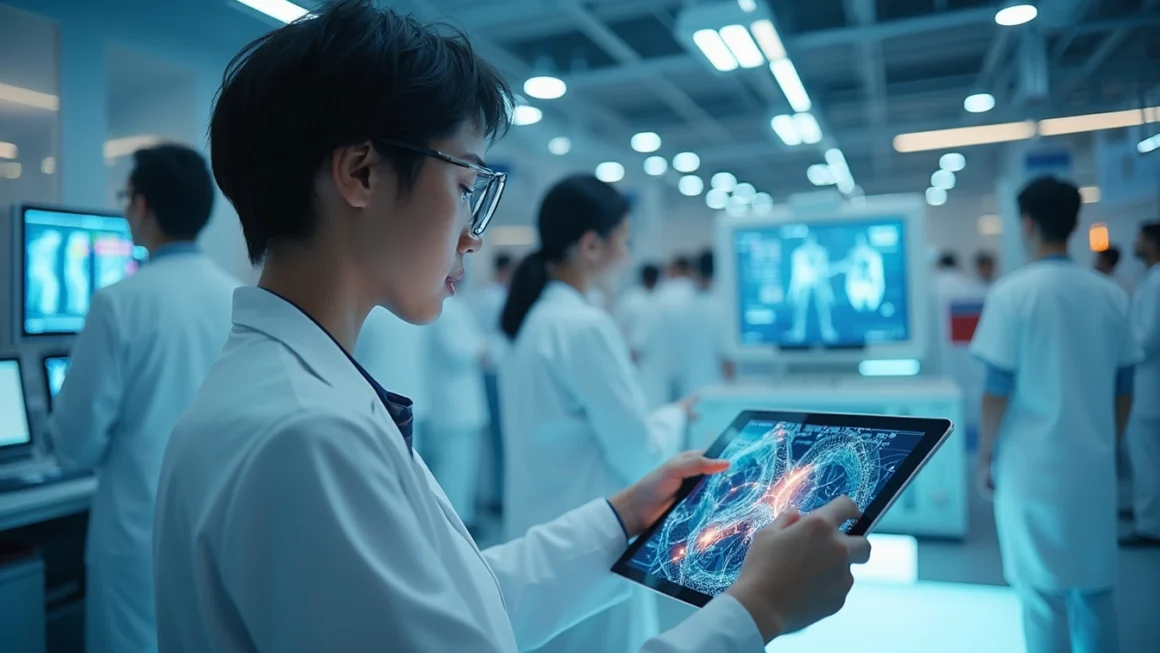The Rise of Artificial Intelligence in Healthcare
Table of Contents
Artificial Intelligence (AI) is rapidly transforming various industries, and healthcare is no exception. Recent developments have shown that AI can potentially revolutionize medical diagnosis, treatment, and patient care. This article explores the latest advancements in AI-powered healthcare and their implications for the future of medicine.
AI’s Impact on Medical Imaging
One of the most significant areas where AI is making strides is in medical imaging. Advanced algorithms are now capable of analyzing X-rays, MRIs, and CT scans with remarkable accuracy. These AI systems can detect anomalies and potential health issues that might be overlooked by human radiologists.
For instance, AI-powered software has shown promising results in identifying early signs of breast cancer in mammograms. This technology could lead to earlier diagnoses and improved patient outcomes. Additionally, AI can help prioritize urgent cases, ensuring that critical patients receive immediate attention.
Personalized Treatment Plans
AI is also playing a crucial role in developing personalized treatment plans. By analyzing vast amounts of patient data, including genetic information, medical history, and lifestyle factors, AI algorithms can suggest tailored treatment options for individual patients.
This personalized approach to medicine can significantly improve treatment efficacy and reduce adverse effects. For example, AI can help oncologists determine the most effective chemotherapy regimen for cancer patients based on their unique genetic makeup and tumor characteristics.
Drug Discovery and Development
The pharmaceutical industry is leveraging AI to accelerate drug discovery and development processes. AI algorithms can analyze millions of compounds and predict their potential effectiveness against specific diseases. This capability dramatically reduces the time and cost associated with bringing new drugs to market.
Moreover, AI can help identify existing drugs that may be repurposed for treating other conditions. This approach has already shown promise in the ongoing fight against COVID-19, where AI has helped researchers identify potential treatments among existing medications.
Remote Patient Monitoring
With the increasing adoption of wearable devices and smart home technology, AI is enabling more effective remote patient monitoring. These systems can continuously collect and analyze patient data, alerting healthcare providers to potential issues before they become critical.
For chronic disease management, AI-powered remote monitoring can help patients better manage their conditions and reduce hospital readmissions. This technology is particularly beneficial for elderly patients or those living in remote areas with limited access to healthcare facilities.
Challenges and Ethical Considerations
While the potential benefits of AI in healthcare are immense, there are also significant challenges and ethical considerations to address. Data privacy and security are paramount concerns, as AI systems require access to vast amounts of sensitive patient information.
There are also questions about the accountability and transparency of AI decision-making in healthcare. It’s crucial to ensure that AI systems are free from bias and that their recommendations can be explained and verified by human experts.
Additionally, there’s a need for regulatory frameworks to govern the development and deployment of AI in healthcare. These regulations must balance innovation with patient safety and ethical considerations.
The Future of AI in Healthcare
As AI technology continues to advance, its role in healthcare is likely to expand further. We can expect to see more sophisticated diagnostic tools, improved treatment outcomes, and more efficient healthcare delivery systems.
However, it’s important to note that AI is not meant to replace healthcare professionals but to augment their capabilities. The human touch in healthcare remains irreplaceable, and the most effective approach will likely be a collaboration between AI systems and human experts.
As we move forward, it’s crucial to address the challenges and ethical concerns associated with AI in healthcare. By doing so, we can harness the full potential of this technology to improve patient care and outcomes.
For those interested in exploring the potential of AI beyond healthcare, automation platforms offer fascinating insights into how AI can be applied across various industries and processes.
Conclusion
The integration of AI in healthcare represents a significant leap forward in medical technology. From improving diagnostic accuracy to personalizing treatment plans and accelerating drug discovery, AI has the potential to transform every aspect of healthcare delivery.
As we continue to navigate this exciting frontier, it’s crucial to balance innovation with ethical considerations and patient safety. With careful implementation and ongoing research, AI could usher in a new era of more efficient, effective, and accessible healthcare for all.




